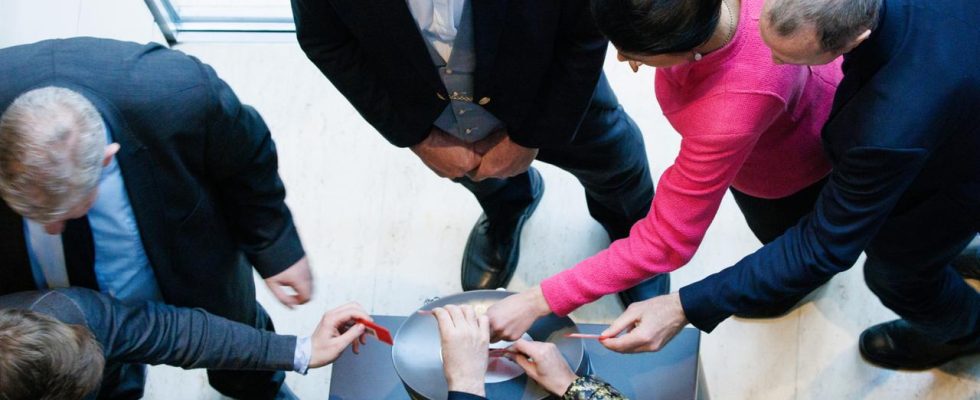The Bundestag has recognized the members of the Left Party and the Wagenknecht Party BSW as parliamentary groups. This means that in the future they will have more rights than non-attached MPs. But there is disagreement on one point.
Almost two months after the left-wing faction was dissolved, the members of the Left and the new Sahra Wagenknecht (BSW) alliance in the Bundestag can now continue as separate groups. The majority in parliament recognized the two new formations and granted them parliamentary rights and millions in state subsidies. The CDU/CSU and AfD went too far with the conditions granted – they voted against the applications. But the Left and BSW are still not entirely satisfied.
The Bundestag still has five parliamentary groups – the SPD, Greens and FDP in the traffic light and the CDU/CSU and AfD in the opposition. The left-wing faction, which most recently had 38 MPs, dissolved at the beginning of December. The reason: After years of dispute, the former parliamentary group leader Wagenknecht and nine other MPs left the Left party and founded the Sahra Wagenknecht alliance. This meant that the minimum size of a parliamentary group was not met and all that was left was to merge as two separate groups – the Left with 28 MPs and the BSW with ten.
Millions for the Left and BSW
Unlike political groups, rights and state subsidies for groups are not regulated by law, but are determined by majority decision. According to the resolutions, the two groups have fewer rights than parliamentary groups and they also receive less state subsidies. The government factions of the SPD, Greens and FDP defined the exact conditions at the beginning of the week.
The Left can expect around 7.4 million euros per year for employees and other costs, the BSW around 4.9 million euros. The group chairmen – currently Dietmar Bartsch for the Left and Wagenknecht for the BSW – should have the same rights as group chairmen. The groups are allowed to submit draft laws, motions and motions for resolutions and submit up to ten small and large parliamentary questions to the federal government per month.
Criticism of limiting requests
There was a dispute about this last point. Both the Left and the BSW protested that these requests could no longer be made indefinitely. “This restriction is an outrage,” said Left MP Heidi Reichinnek.
Small and large inquiries would bring information to light that the government and authorities would prefer to keep under wraps, said Left Party leader Janine Wissler: “We have repeatedly put our finger in the wound. That’s what the traffic light obviously wants us to do prevent.”
BSW MP Jessica Tatti spoke of “unnecessary bullying of the opposition”. Both groups complain that the opposition’s control rights are being restricted. Both want to check whether this is legally vulnerable.
Ampel rejects criticism
Speakers at the traffic light rejected the criticism. The specifications correspond exactly to “measure and balance,” said FDP MP Torsten Herbst. In fact, the opposition traditionally makes a lot of questions to the federal government and tries to attract attention and expose grievances by publishing the answer.
According to group leader Bartsch, leftists made 966 small requests from the end of 2021 to the end of December 2023. For example, they regularly request data on the development of pensions and wages in East and West, on right-wing extremism or arms exports.
Uli Hauck, ARD Berlin, tagesschau, February 2nd, 2024 1:52 p.m

